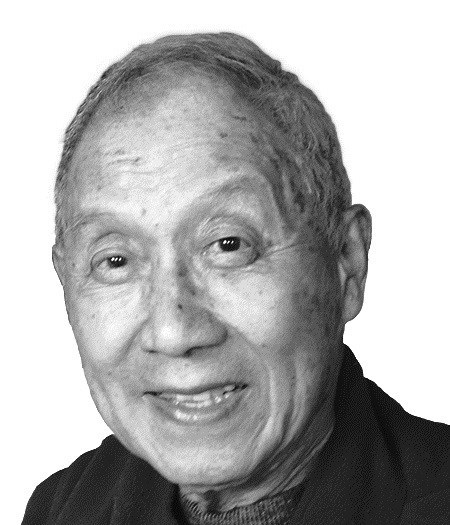
OBITUARY
Alfred S. Wang
March 16, 1931 – September 20, 2015

Alfred Shih-p’u Wang, beloved husband, father, and grandfather, passed away peacefully on Sept. 20, 2015, in Missouri City, Texas, at home and surrounded by his wife of 54 years, Veronica, and his two daughters, Dorothy and Lisa. In 2001, he and his wife moved to Missouri City, where their second daughter, Lisa, a pediatric oncologist at Texas Children's Hospital, lives.
Wang was Associate Professor Emeritus of English at East Carolina University (ECU) in Greenville, N.C., and the author of several articles on American literature and comparative literature, as well as poems, in such journals as Literature and Medicine, Walt Whitman Review, and Tar River Poets. He wrote on writers and thinkers ranging from Emerson, Whitman, James Baldwin, and Maxine Hong Kingston to Lao-tzu, Chuang-tzu, and Lu Xun. From 1990 to 1996, he served on the North Carolina Humanities Council.
He taught in the English Department at ECU from 1967 to 1994; his wife also taught in the same department from 1967 to 2000. They were one of the very few Chinese nationals not only to earn Ph.D.s in English Literature at an American university but also to teach as American college professors in that field in the era before the normalization of relations between the United States and the People's Republic of China (and were likely the sole husband-and-wife couple from China who taught English literature at the college level in the United States in that same period). They were also one of the first academics to teach and publish in the new field of Asian American literature.
Wang was born March 16, 1931 (lunar calendar) in Yantai (Chefoo), China, the son of Wang Chen-dong and Lin Yu-ying. He was a third-generation Presbyterian, his paternal grandmother having been converted by American missionaries at the end of the nineteenth century. His father and aunt held leadership positions in the YMCA/YWCA in China, and Wang began to learn English at an early age. He grew up and lived under the shadow of the Japanese occupation of China: an older brother, a guerilla fighter, was killed in the anti-Japanese struggle; Wang’s father was briefly imprisoned by the Japanese and the family subsequently fled to Shanghai.
Wang graduated from the prestigious high school of St. John’s University in Shanghai. Determined to obtain a Ph.D. in English literature, he smuggled out of the People’s Republic of China in 1952 to Hong Kong. In 1955, with the personal intercession of John Foster Dulles, Wang came to the United States to attend Davidson College in North Carolina, on a full scholarship--one of the very few nonwhites at the all-male college. It was pre-Civil Rights and the height of the Cold War. He was Class Poet at Davidson in 1958. While at Davidson, he met his wife Veronica (Chou Ch’eng-fang), who was attending nearby Queens College. After they both graduated with B.A.s in English, they worked for two years in New York City, where they were married in 1961.
In 1967, he and his wife earned their Ph.D.s in English literature--he with a dissertation on William Blake and she with a dissertation on the poetry of Matthew Arnold--at Tulane University in New Orleans and took up positions as Assistant Professors at ECU. They lived for 34 years in Greenville, N.C. where they raised their daughters. His older daughter, Dorothy, is an Associate Professor who teaches English literature at Williams College in Massachusetts.
Wang was an artistic spirit who loved literature and music, especially Beethoven, Mozart, and Brahms; he also had a deep sense of social justice. He is deeply missed by his family. Wang is survived by his wife and daughters Dorothy (David Paul) and Lisa (Jeffrey R. Steinbauer), his grandson Henry Wang Steinbauer, two sisters--Jung Chen Stella Chu of Whispering Pines, N.C., and Quan-zhen Wang of Hong Kong, China--a brother, Shih-yu Patrick Wang of Vancouver, Canada, and five nieces and two nephews.
Show your support
Add a Memory
Share Obituary
Get Updates
Services
SHARE OBITUARY
- RECEIVE UPDATES
v.1.8.18